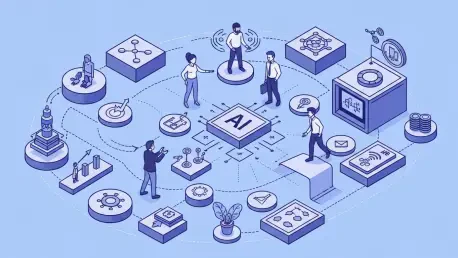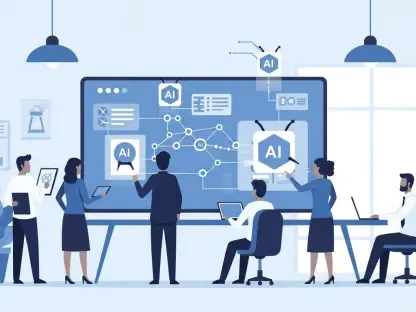As a seasoned technologist with a deep focus on Artificial Intelligence, Laurent Giraid has carved out a reputation as a thought leader in machine learning, natural language processing, and the ethical implications of AI. With years of experience driving innovation and shaping strategic direction in the tech space, Laurent offers invaluable insights into how AI is transforming industries and what leaders must consider to stay ahead. In this interview, we dive into the evolving landscape of AI, exploring its potential to revolutionize business operations, the challenges of ethical implementation, and the strategies organizations can adopt to harness its power responsibly.
How did your journey in Artificial Intelligence begin, and what keeps you passionate about this field?
My journey in AI started during my university days when I stumbled upon early research in machine learning. I was fascinated by the idea that machines could learn from data and improve over time—it felt like science fiction coming to life. What keeps me passionate is the endless potential of AI to solve complex problems, from healthcare diagnostics to climate modeling. Every day, there’s a new challenge or breakthrough that pushes me to explore further and contribute to meaningful advancements.
What do you see as the most transformative application of AI for businesses today?
I believe AI’s ability to analyze vast amounts of data in real time is game-changing for businesses. Take predictive analytics, for instance—it’s helping companies forecast market trends, optimize supply chains, and personalize customer experiences at an unprecedented scale. Beyond that, natural language processing is revolutionizing how businesses interact with customers through chatbots and virtual assistants. These tools aren’t just cutting costs; they’re creating deeper connections with users by delivering tailored solutions.
Can you share a specific example of how machine learning has driven measurable impact for an organization you’ve worked with?
Absolutely. I worked with a retail company that was struggling with inventory management. By implementing a machine learning model, we analyzed historical sales data, seasonal trends, and even weather patterns to predict demand more accurately. The result was a 30% reduction in overstock and a significant boost in cash flow. It wasn’t just about numbers; it gave the leadership team confidence to make bolder decisions on product launches and expansions.
Ethics in AI is a topic you’re deeply invested in. What are some of the biggest ethical challenges businesses face when adopting AI technologies?
One of the biggest challenges is bias in AI systems. If the data used to train models reflects historical prejudices, the AI will perpetuate those biases—whether in hiring tools or customer targeting. Another concern is privacy; businesses must be transparent about how they collect and use data, especially with regulations like GDPR in play. There’s also the issue of accountability—when an AI system makes a decision, who’s responsible if it goes wrong? These are tough questions, and businesses need to prioritize ethical frameworks from the start.
How can organizations balance the drive for innovation with the need to implement AI responsibly?
It starts with building a culture of responsibility. Companies should establish clear ethical guidelines and involve diverse teams in AI development to minimize blind spots. Regular audits of AI systems can help catch biases or unintended consequences early. It’s also critical to engage with stakeholders—customers, employees, and regulators—to understand their concerns and build trust. Innovation doesn’t have to come at the expense of ethics; in fact, responsible AI often leads to better long-term outcomes because it fosters credibility and loyalty.
What role do you think natural language processing will play in shaping the future of customer engagement?
Natural language processing, or NLP, is poised to redefine customer engagement by making interactions more human-like and intuitive. We’re already seeing this with advanced chatbots that can handle complex queries or even detect a customer’s tone to adjust responses. In the future, I expect NLP to enable hyper-personalized experiences—think virtual assistants that not only answer questions but anticipate needs based on past interactions. This could transform industries like e-commerce or customer support, where empathy and speed are everything.
How do you advise business leaders to prepare their teams for the integration of AI technologies?
First, leaders need to invest in upskilling their workforce. AI isn’t here to replace people but to augment their capabilities, so training employees to work alongside these tools is key. Second, foster a mindset of adaptability—AI evolves quickly, and teams need to be ready to pivot. Finally, communicate the ‘why’ behind AI adoption. If employees understand how AI can make their work more impactful, they’re more likely to embrace it rather than resist change.
What is your forecast for the future of AI over the next decade?
I’m optimistic but cautious. Over the next decade, I expect AI to become even more embedded in our daily lives, from smarter cities to personalized healthcare. We’ll likely see breakthroughs in areas like explainable AI, where systems can clearly justify their decisions, addressing some of today’s trust issues. However, the flip side is that regulation will need to catch up to manage risks around privacy and misuse. My forecast is that AI will drive incredible progress, but only if we prioritize collaboration between technologists, policymakers, and society to steer it in the right direction.









